| Srl | Item |
| 1 |
ID:
123843
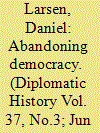

|
|
|
|
|
| Publication |
2013.
|
| Summary/Abstract |
Through an examination of American policy toward Germany during late 1918 to 1919, this article challenges widely held ideas about the attitudes of American President Woodrow Wilson toward democracy promotion. Scholars typically have seen in Wilson's foreign policy the antecedents of several subsequent U.S. presidents' policies of democracy promotion and democratic interventionism. This study contends that at least during the second half of Wilson's presidency, however, Wilson did not regard it as appropriate for the United States to intervene in the internal political affairs of other nations to promote democracy. While he hoped that postwar Germany would come to embrace democracy, he believed that the Germans would have to find democracy on their own. Despite the fact that those American diplomatic officials who were most familiar with the situation in Germany continually urged a more active U.S. policy to promote democracy there, Wilson remained deeply skeptical of the new German government and adhered firmly to the view that the United States should refrain from attempting to influence Germany's internal political affairs.
|
|
|
|
|
|
|
|
|
|
|
|
|
|
|
|
| 2 |
ID:
151110
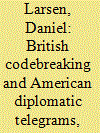

|
|
|
|
|
| Summary/Abstract |
During the First World War, British intelligence solved the United States' diplomatic codes and were reading its diplomatic telegrams transmitted between Washington and US diplomatic outposts throughout Europe. Controversy has emerged over when the British succeeded in solving these codes, with two historians relatively recently having claimed that British intelligence succeeded in doing so from the beginning of the war or soon after. Through a thorough consideration of the available documentation, this piece aims to correct these mistaken claims and to date the completion of the British solving of American codebooks to the middle phase of the war, to between October 1915 and January 1916. It seeks to lay reliable foundations for further work by showing that research into the wartime impact of British signals’ intelligence on Anglo-American relations is necessarily limited to only the middle and later phases of the war.
|
|
|
|
|
|
|
|
|
|
|
|
|
|
|
|
| 3 |
ID:
101128
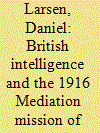

|
|
|
|
|
| Publication |
2010.
|
| Summary/Abstract |
Colonel Edward M. House, the close personal confidant of American President Woodrow Wilson, disembarked in Great Britain in January 1916 on a mission to bring the First World War to a close under the auspices of American mediation. Although his mission, which culminated in a secret pact between the United States and Great Britain known as the House-Grey Memorandum, has been studied by several scholars, the involvement of British intelligence with respect to that mission has never received more than cursory attention. Through a careful analysis of the surviving documents, this article reconstructs British intelligence's activities with respect to House's mission, examines the countermeasures that House employed as he attempted to protect the secrecy of his negotiations, delineates the role played by different British intelligence agencies and assesses their response to their findings.
|
|
|
|
|
|
|
|
|
|
|
|
|
|
|
|
| 4 |
ID:
164183
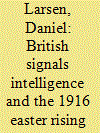

|
|
|
|
|
| Summary/Abstract |
Historians for decades have placed Room 40, the First World War British naval signals intelligence organization, at the centre of narratives about the British anticipation of and response to the Easter Rising in Ireland in 1916. A series of crucial decrypts of telegrams between the German embassy in Washington and Berlin, it has been believed, provided significant advance intelligence about the Rising before it took place. This article upends previous accounts by demonstrating that Room 40 possessed far less advance knowledge about the Rising than has been believed, with most of the supposedly key decrypts not being generated until months after the Rising had taken place.
|
|
|
|
|
|
|
|
|
|
|
|
|
|
|
|
| 5 |
ID:
171855
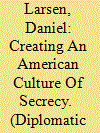

|
|
|
|
|
| Summary/Abstract |
Recently, historians have started to consider the role and evolution of secrecy in American foreign affairs in the post-1945 period. A special issue of this journal was even devoted to it in 2011.1 Yet historians have never meaningfully considered secrecy’s role in U.S. international relations prior to the Second World War. International historians have neglected to appreciate that the United States’ present institutionalized culture of official secrecy concerning foreign affairs is, uniquely among the nineteenth century’s great powers, wholly a creature of the twentieth century and would be profoundly alien to any of the State Department’s occupants in the years leading up to the First World War. Whereas the publication of State Department cables in 2010 on WikiLeaks provoked paroxysms of official panic, during the second half of the nineteenth century such publications were not only routine but undertaken annually by the department itself. Secrecy simply was not integral to how the nation went about its business abroad.
|
|
|
|
|
|
|
|
|
|
|
|
|
|
|
|